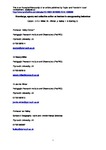Knowledge, agency and collective action as barriers to energy-saving behaviour
| dc.contributor.author | Cotton, Debby | |
| dc.contributor.author | Miller, W | |
| dc.contributor.author | Winter, J | |
| dc.contributor.author | Bailey, Ian | |
| dc.contributor.author | Sterling, S | |
| dc.date.accessioned | 2016-04-29T14:52:37Z | |
| dc.date.issued | 2015-05-20 | |
| dc.identifier.issn | 1354-9839 | |
| dc.identifier.issn | 1469-6711 | |
| dc.identifier.uri | http://hdl.handle.net/10026.1/4569 | |
| dc.description | peerreview_statement: The publishing and review policy for this title is described in its Aims & Scope. aims_and_scope_url: http://www.tandfonline.com/action/journalInformation?show=aimsScope&journalCode=cloe20 | |
| dc.description.abstract |
Energy saving is becoming a rising priority as a response to climate change and fossil fuel depletion in recent years. However, despite energy-related behaviour change being an important part of many environmental education initiatives, “energy literacy” among citizens remains patchy in both the USA and the UK, with evidence of strong positive attitudes but less consistent knowledge. Whilst it is clear that increasing knowledge does not automatically produce behaviour changes, potential questions must be asked about the logic of focusing solely on behaviour without simultaneously exploring and enhancing understanding of energy issues. This research, undertaken at a higher education institution with a strong focus on sustainability, illustrates the potential risks of targeting behaviour change and individual action at the expense of increasing knowledge, or encouraging collaborative and democratic endeavours. Results from an online survey indicate widespread misconceptions about energy which may reduce the effectiveness of energy-saving behaviours, alongside variable levels of motivation and engagement with energy issues. Respondents report a strong belief in the efficacy of personal changes, yet uncertainty about their capacity to influence business and government alongside a persistent faith in science to provide solutions to energy issues. The paper concludes by reflecting on the challenges arising from these findings for understanding agency and effectiveness in energy relationships. | |
| dc.format.extent | 1-15 | |
| dc.language | en | |
| dc.language.iso | en | |
| dc.publisher | Taylor and Francis | |
| dc.subject | energy literacy | |
| dc.subject | higher education | |
| dc.subject | knowledge | |
| dc.subject | trust | |
| dc.subject | agency | |
| dc.subject | behaviour | |
| dc.title | Knowledge, agency and collective action as barriers to energy-saving behaviour | |
| dc.type | journal-article | |
| dc.type | Journal Article | |
| plymouth.author-url | https://www.webofscience.com/api/gateway?GWVersion=2&SrcApp=PARTNER_APP&SrcAuth=LinksAMR&KeyUT=WOS:000391263200006&DestLinkType=FullRecord&DestApp=ALL_WOS&UsrCustomerID=11bb513d99f797142bcfeffcc58ea008 | |
| plymouth.issue | 7 | |
| plymouth.volume | 21 | |
| plymouth.publication-status | Published | |
| plymouth.journal | Local Environment | |
| dc.identifier.doi | 10.1080/13549839.2015.1038986 | |
| plymouth.organisational-group | /Plymouth | |
| plymouth.organisational-group | /Plymouth/Faculty of Health | |
| plymouth.organisational-group | /Plymouth/Faculty of Science and Engineering | |
| plymouth.organisational-group | /Plymouth/Faculty of Science and Engineering/School of Geography, Earth and Environmental Sciences | |
| plymouth.organisational-group | /Plymouth/PS - Library and Educational Development | |
| plymouth.organisational-group | /Plymouth/REF 2021 Researchers by UoA | |
| plymouth.organisational-group | /Plymouth/REF 2021 Researchers by UoA/UoA14 Geography and Environmental Studies | |
| plymouth.organisational-group | /Plymouth/REF 2021 Researchers by UoA/UoA23 Education | |
| plymouth.organisational-group | /Plymouth/Users by role | |
| plymouth.organisational-group | /Plymouth/Users by role/Academics | |
| dcterms.dateAccepted | 2015-04-02 | |
| dc.rights.embargodate | 2016-5-20 | |
| dc.identifier.eissn | 1469-6711 | |
| dc.rights.embargoperiod | 12 months | |
| rioxxterms.versionofrecord | 10.1080/13549839.2015.1038986 | |
| rioxxterms.licenseref.uri | http://www.rioxx.net/licenses/under-embargo-all-rights-reserved | |
| rioxxterms.licenseref.startdate | 2015-05-20 | |
| rioxxterms.type | Journal Article/Review |


